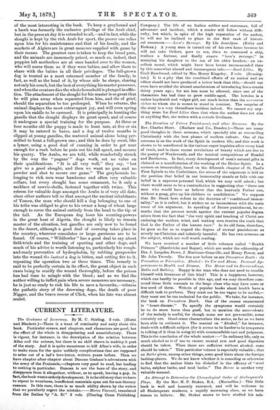CURRENT LITERATURE.
The Grahams of Invermoy. By M. C. Stirling. 3 vols. (Hurst and Blackett.)—There is a want of continuity and unity about this book. Particular scenes, and chapters, and characters are good, but the effect of the whole is disappointing and unsatisfactory. There is vigour, for instance, in the description of the relation between Allan and the actress, but there is no skill shown in making it part of the story. And it is quite monstrous to kill Allan's wife, in order to make room for the quite 'unlikely complications that are supposed to arise out of a lad's love-letter, written years before. Then we have chapter after chapter about Duncan Graham's adventures with the army of the Peninsula,—chapters very good to read, but leading to nothing in particular. Duncan is not the hero of the story, and disappears from it altogether, without, so to speak, leaving a gap. In fact, the book wants orderly development. It is the old story that we have to repeat to weariness, insufficient materials spun out for non-literary reasons. In this case, there is so much ability shown by the writer that we peculiarly regret the mistake.--Mareo Visconti, translated from the Italian by "A. D." 3 vols. (Charing Cross Publishing Company.) The life of an Italian soldier and statesman, full of adventure and incident, which a reader will follow without diffi- culty, but which, in spite of the high reputation of the author, he will not be inclined to place in the first rank of histori- cal romances.—Lore's Revenge. By Ida Joscelyne. (Kirby and Endean.) A young man is turned out of his own home because he will not take Orders, goes to sea, rises to command a ship, realises a fortune, and finally exacts " love's revenge," in marrying his daughter to the son of his elder brother,—an ex- cellent moral, which might have been better recommended than by this somewhat absurd and inconsequent tale.—Dead Lilies. By Cecil Haselwood, edited by Mrs. Henry Kingsley. 2 vols. (Reming- ton.) It is a pity that the combined efforts of an author and an editor should not have produced a better book than this,—should not even have avoided the absurd anachronism of introducing lawn-tennis thirty years ago ; for not less must be allowed, since one of the characters has had time to grow middle-aged. The heroine is a rather hoydenish and vulgar girl, not much better than the noureausi riches .to whom she is meant to stand in contrast. The surprise of the story is a very threadbare incident indeed. We cannot say any- thing more for Dead Lilies than that when the author does not aim at anything fine, she writes with a certain liveliness.


































 Previous page
Previous page